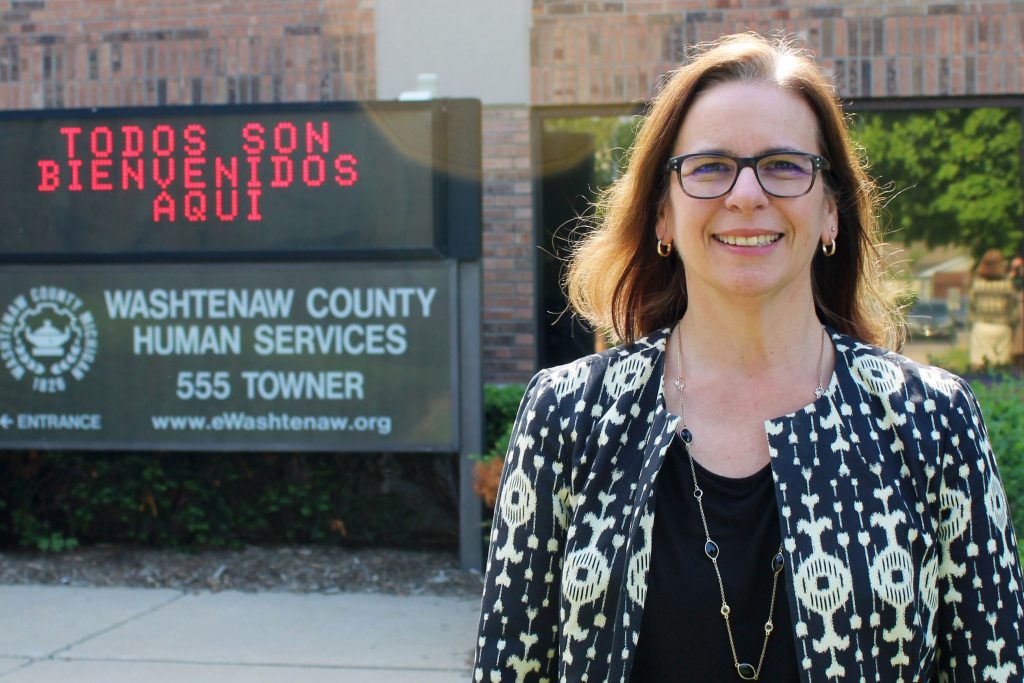Within days of the first documented COVID-19 case in the U.S., public health departments across the nation began the biggest pandemic response effort in a century. The pandemic illuminated the critical role of public health in communities across the world. And in many communities, including ours, these lessons were about unaddressed health disparities that existed decades before the pandemic.
While response efforts are ongoing, the Washtenaw County Health Department was quick to map an aggressive path to “build a stronger, more equity-driven health department”—to address the significant health disparities that compounded the effects of COVID-19 on communities of color.
“COVID-19 really highlighted the importance of investing in our public health infrastructure,” says Jimena Loveluck, the department’s health officer and WHI Steering Committee member. She notes that at the height of the pandemic, the health department brought on 60 temporary workers and was still stretched past capacity.
“I think that, generally, very few people think about the work of public health and the local health department on a day-to-day basis,” continues Loveluck. “And certainly, with COVID, this placed the health department in the forefront of not only the response, but being a reliable source of information and guidance.”
Recognizing the need for continued investment after the pandemic, it was announced in December 2021 that the health department would receive over $2.5 million in American Rescue Plan (ARPA) funds to support various initiatives, and, importantly, to engage and support historically underserved areas of the county in an ongoing, collaborative manner.
“We have a tremendous opportunity to invest in public health and make sure those investments improve health and opportunity where most needed moving forward,” says Loveluck.
One important strategy to support underserved areas involves expanding the number of Community Health Workers (CHWs)—frontline public health workers who are also trusted members of the communities they serve. These individuals are critical in helping the health department deliver important communications and build service links with communities that can be difficult to reach.
CHWs help communities “quickly digest changing information,” says Loveluck, “and ensure that we’re able to reach the diverse communities and populations that exist in our county.”
Loveluck notes that while the health department utilized CHWs prior to the pandemic, expanding their presence will help the department take a preventive approach to address the social determinants of health—housing, food, transportation, and more—and the underlying root causes of local health inequities.
Early in the pandemic, it became clear that communities of color in Washtenaw County were seeing disproportionate impacts of COVID-19, emphasizing the need for expanded testing and outreach in these communities. CHWs became an integral part of vaccine outreach teams and served as vaccine ambassadors to connect with and support residents in communities with lower vaccination rates.
The health department also conducted outreach and education efforts in other languages, like Spanish, utilizing social media and Facebook Live events to reach communities with trusted information and messaging around COVID-19.
“Obviously, it’s really wonderful that both Juan [Marquez, the health department’s medical director] and I speak Spanish”, says Loveluck. “Being able to share all of the efforts we were working on [in both languages], from what was changing around isolation and quarantine, to where you could get N95 masks, I think was really important.”
Adapting strategies to meet the needs of specific communities is a continued focus for the department. In a recent data analysis, Marquez highlighted how the department identified communities with low vaccination rates to distribute at-home testing kits.
“If you look at vaccination rates for Ypsilanti, it’s lower than the rest of the county,” says Marquez. “But when you look at incident rates, controlled for the baseline, during the Delta surge in the fall, it was actually lower than the rest of the county. So, despite lower vaccination rates, something else must have kept those rates down.”
While the full scope of this work is still developing, both Loveluck and Marquez have underscored the need to partner with other organizations in their mission to achieve health equity in Washtenaw County.
Marquez points out that because of COVID-19, the department is in a better position to create two-way partnerships that might have been more difficult in the past.
“By necessity, COVID-19 required us to strengthen existing partnerships,” says Marquez, citing new meetings and newsletters that allow them to stay in regular communication with a variety of local organizations to address both COVID and non-COVID issues.
Loveluck reiterates the importance of utilizing a diverse public health workforce that reflects the communities it serves, citing trust as a crucial factor for creating health equity.
“With the American Rescue Plan funding,” she says, “we’re really able to strengthen our community engagement to address some of these health inequities.”
—
Want to get connected with the Washtenaw County Health Department? Please e-mail health@washtenaw.org or call the main phone line at 734-544-6700.
You can also stay informed about timely public health news by subscribing to their email updates here.

